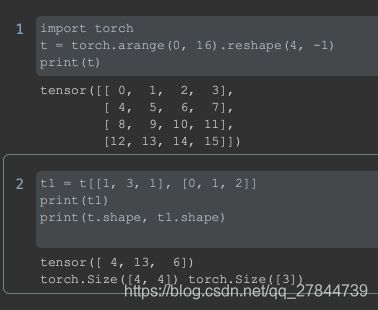tensor用方括号取值 给定坐标 选取部分元素
文章目录
- 一、 问题描述
- 二、 问题背景
- 三、 解决方案
- 四、 示例
- 五、 补充
一、 问题描述
已知BATCH_SIZE个坐标,从n*n的矩阵中取出BATCH_SIZE个值。
二、 问题背景
上周自己写CRF的时候遇到了一个问题,
在pytorch官方的BI-LSTM CRF教程中,代码如下
def _score_sentence(self, feats, tags):
# Gives the score of a provided tag sequence
score = torch.zeros(1)
tags = torch.cat([torch.tensor([self.tag_to_ix[START_TAG]], dtype=torch.long), tags])
for i, feat in enumerate(feats):
score = score + \
self.transitions[tags[i + 1], tags[i]] + feat[tags[i + 1]]
score = score + self.transitions[self.tag_to_ix[STOP_TAG], tags[-1]]
return score
输入向量没有batch_size维度,输入是一句话对应的特征和标签,输出是一个数。
我就想在实现的时候加一个batch_size维度就好吧,结果代码写成了这样:
def _score_sentence(self, feats, tags):
# Gives the score of a provided tag sequence
score = torch.zeros(BATCH_SIZE, 1).to(device)
temp_tensor = torch.tensor([self.tag_to_ix[START_TAG]], dtype=torch.long).to(device)
temp_tensor = temp_tensor.expand(BATCH_SIZE, 1)
tags = torch.cat([temp_tensor, tags], dim=-1)
for i, feat in enumerate(feats.permute([1, 0, 2])):
for b in range(BATCH_SIZE):
tran = self.transitions[tags[b, i + 1], tags[b, i]]
score[b] = score[b] + tran + feat[b, tags[b, i + 1]]
for b in range(BATCH_SIZE):
score[b] = score[b] + self.transitions[self.tag_to_ix[STOP_TAG], tags[b, -1]]
return score
迭代计算batch中每一个句子的得分,然后赋值给score的每一位。
在实际运行过程中,计算的速度特别慢,可能相当于放弃了并行化计算框架的优势。
所以就想到能不能有方法实现这种功能:从n*n的转移矩阵中取出BATCH_SIZE个值。
在pytorch官方文档上找了很多相关张量操作,比如index_select、masked_select、scatter、gather,然而都没有完美解决问题。
三、 解决方案
在自己写的CRF太慢之后,就用了torchcrf这个包。
今天看了这个包里的代码,这部分是这样的:
# emissions: (seq_length, batch_size, num_tags)
# tags: (seq_length, batch_size)
# mask: (seq_length, batch_size)
for i in range(1, seq_length):
# Transition score to next tag, only added if next timestep is valid (mask == 1)
# shape: (batch_size,)
score += self.transitions[tags[i - 1], tags[i]] * mask[i]
# Emission score for next tag, only added if next timestep is valid (mask == 1)
# shape: (batch_size,)
score += emissions[i, torch.arange(batch_size), tags[i]] * mask[i]
经过总结得知:
M[x, y]
- 当M是n*n的矩阵,x, y是合法的整数时,能取到矩阵里的一个值;
- 当x, y是分号隔开的整数时,返回一个子矩阵;
- 当x, y都是长度为b的整数向量时,返回一个长度为b的向量
[M[x[0], y[0]], M[x[1], y[1]],……,M[x[b-1], y[b-1]]] - 当x是一个整数, y是长度为b的整数向量时,返回一个长度为b的向量
[M[x, y[0]], M[x, y[1]],……,M[x, y[b-1]]],反之亦然。
异常情况:当x, y为长度不等的向量时
import torch
t = torch.arange(0, 16).reshape(4, -1)
print(t)
t1 = t[[1, 3], [0, 1, 2]]
print(t1)
print(t.shape, t1.shape)
会有如下异常:
IndexError: shape mismatch: indexing tensors could not be broadcast together with shapes [2], [3]
四、 示例

上图表示取坐标为[1, 0], [3, 1], [1,2]的三个元素。
本文只选取了被选矩阵为二阶张量(二维矩阵)的情况作为举例。
对于更高阶张量的取值,只需要在方括号中对应位置上添加索引即可。
M[x, y, z]
五、 补充
M[mask]
当mask是一个bool类型的矩阵,且与M形状相同时,返回一个新的一维张量,该张量mask作为掩码对M进行索引。
import torch
t = torch.arange(0, 16).reshape(4, -1)
print(t)
mask = t > 7
print(mask)
print(mask.dtype)
t1 = t[mask]
print(t1)
print(t1.dtype)
tensor([[ 0, 1, 2, 3],
[ 4, 5, 6, 7],
[ 8, 9, 10, 11],
[12, 13, 14, 15]])
tensor([[False, False, False, False],
[False, False, False, False],
[ True, True, True, True],
[ True, True, True, True]])
torch.bool
tensor([ 8, 9, 10, 11, 12, 13, 14, 15])
torch.int64